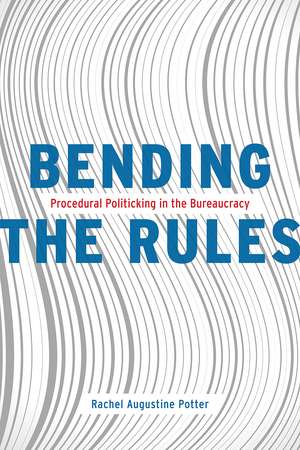Bending the Rules: Procedural Politicking in the Bureaucracy
Autor Rachel Augustine Potteren Limba Engleză Paperback – 15 iun 2019
Who determines the fuel standards for our cars? What about whether Plan B, the morning-after pill, is sold at the local pharmacy? Many people assume such important and controversial policy decisions originate in the halls of Congress. But the choreographed actions of Congress and the president account for only a small portion of the laws created in the United States. By some estimates, more than ninety percent of law is created by administrative rules issued by federal agencies like the Environmental Protection Agency and the Department of Health and Human Services, where unelected bureaucrats with particular policy goals and preferences respond to the incentives created by a complex, procedure-bound rulemaking process.
With Bending the Rules, Rachel Augustine Potter shows that rulemaking is not the rote administrative activity it is commonly imagined to be but rather an intensely political activity in its own right. Because rulemaking occurs in a separation of powers system, bureaucrats are not free to implement their preferred policies unimpeded: the president, Congress, and the courts can all get involved in the process, often at the bidding of affected interest groups. However, rather than capitulating to demands, bureaucrats routinely employ “procedural politicking,” using their deep knowledge of the process to strategically insulate their proposals from political scrutiny and interference. Tracing the rulemaking process from when an agency first begins working on a rule to when it completes that regulatory action, Potter shows how bureaucrats use procedures to resist interference from Congress, the President, and the courts at each stage of the process. This exercise reveals that unelected bureaucrats wield considerable influence over the direction of public policy in the United States.
With Bending the Rules, Rachel Augustine Potter shows that rulemaking is not the rote administrative activity it is commonly imagined to be but rather an intensely political activity in its own right. Because rulemaking occurs in a separation of powers system, bureaucrats are not free to implement their preferred policies unimpeded: the president, Congress, and the courts can all get involved in the process, often at the bidding of affected interest groups. However, rather than capitulating to demands, bureaucrats routinely employ “procedural politicking,” using their deep knowledge of the process to strategically insulate their proposals from political scrutiny and interference. Tracing the rulemaking process from when an agency first begins working on a rule to when it completes that regulatory action, Potter shows how bureaucrats use procedures to resist interference from Congress, the President, and the courts at each stage of the process. This exercise reveals that unelected bureaucrats wield considerable influence over the direction of public policy in the United States.
Preț: 199.25 lei
Nou
Puncte Express: 299
Preț estimativ în valută:
38.14€ • 39.23$ • 31.64£
38.14€ • 39.23$ • 31.64£
Carte disponibilă
Livrare economică 28 ianuarie-11 februarie
Livrare express 14-18 ianuarie pentru 22.02 lei
Preluare comenzi: 021 569.72.76
Specificații
ISBN-13: 9780226621746
ISBN-10: 022662174X
Pagini: 256
Ilustrații: 24 line drawings, 22 tables
Dimensiuni: 152 x 229 x 20 mm
Greutate: 0.31 kg
Ediția:First Edition
Editura: University of Chicago Press
Colecția University of Chicago Press
ISBN-10: 022662174X
Pagini: 256
Ilustrații: 24 line drawings, 22 tables
Dimensiuni: 152 x 229 x 20 mm
Greutate: 0.31 kg
Ediția:First Edition
Editura: University of Chicago Press
Colecția University of Chicago Press
Notă biografică
Rachel Augustine Potter is assistant professor of politics at the University of Virginia. From 2005 to 2007, she worked as a desk officer at the Office of Information and Regulatory Affairs, the White House clearinghouse for agency regulations.
Cuprins
Acknowledgments
List of Abbreviations
1 The Power of Procedure
2 The Nuts and Bolts of Notice-and-Comment
3 Rulemaking as a Strategic Enterprise
4 Writing as a Tool
5 Consultation as a Tool
6 Timing as a Tool
7 The Case of Menu Labeling
8 Procedural Politicking in Perspective
Data Appendix
References
Index
List of Abbreviations
1 The Power of Procedure
2 The Nuts and Bolts of Notice-and-Comment
3 Rulemaking as a Strategic Enterprise
4 Writing as a Tool
5 Consultation as a Tool
6 Timing as a Tool
7 The Case of Menu Labeling
8 Procedural Politicking in Perspective
Data Appendix
References
Index
Recenzii
"Bending the Rules is a model of social science research. It combines a theoretical account of agency rulemaking in a constrained political system with careful analysis of quantitative and qualitative data to yield insights on how federal agencies strategically utilize the administrative tools to create rules and regulations under various political conditions."
